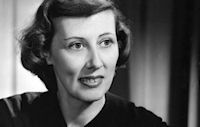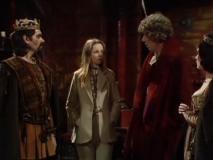An Unearthly Series - The Origins of a TV Legend
Thursday, 27 June 2013 - Reported by Marcus

 The thirteenth in our series of features telling the story of the creation of Doctor Who, and the people who made it happen.
The thirteenth in our series of features telling the story of the creation of Doctor Who, and the people who made it happen.The story so far: Pre-production is now under way on the new Saturday evening science fiction series Doctor Who. Conceived by Sydney Newman, the series was expected to air on BBC Television in the late summer. A producer had been appointed, Verity Lambert, but the show was far from being ready. With no completed scripts and no actors yet cast, the new producer was in for a rocky ride.
At the end of June Sydney Newman returned from holiday to discover all was not well with his new show. Like any big organisation the BBC throughout its history has often suffered from an overblown bureaucracy and middle managers determined to protect process over progress, Doctor Who was not immune from such obstacles and on the 27th June 1963, exactly fifty years ago today, Newman was determined to tackle the problem.

In a heated phone call with Joanna Spicer, the Assistant Controller (Planning) Television, Newman listened to some of the complaints. The new series had bypassed the proper BBC procedures and the production had been carrying out auditions without authorisation he heard. Indeed just two days before director Rex Tucker had been interviewing actresses for the role of Susan Foreman. Furthermore, he was told the series would place unacceptable demands on the servicing departments due to its ambitious nature. Scripts weren’t ready and production was way behind schedule.
Newman leapt to the defence of his team. He dictated a memo to Spicer which pulled no punches. It was entitled Doctor Who Hassle.
Doctor Who Hassle
From: Sydney Newman.
To: Joanna Spicer
27 June 1963
Your comments of today on the phone absolutely flabbergasted me and I take exception to most of what you said. We are trying to get a new children's serial out economically and quickly have from what I can see the Serials Department of this group has acted in complete accordance with all standard Corporation procedures.
In view of the above and since the first recording date is only five weeks away do you wonder we are anxious not to be held up? We have got to cast people who must wear well over something like 52 episodes. I cannot understand from the mass of correspondence that has gone on about this project why permission is still required from your office. At no time have I received from Ch.P(1) (Controller of Programmes) or anybody else, the notion that the project was ever vaguely in doubt. Especially as we have in the main held to the limitations stated on 26 April. While I may be ignorant of some of the finer points of Corporation routine, it is apparent that Ayton Whitaker and others in my group are not. I am, therefore, surprised at what seems to me a last minute hold up. After all it was only H.Tel.Des who dug his heels in about the scripts and he changed his mind two days ago.
You may assume only that I intend to get drama programmes out on time and within budget. That my attitude to you and the Corporation routine will never be less than correct.
From: Sydney Newman.
To: Joanna Spicer
27 June 1963
Your comments of today on the phone absolutely flabbergasted me and I take exception to most of what you said. We are trying to get a new children's serial out economically and quickly have from what I can see the Serials Department of this group has acted in complete accordance with all standard Corporation procedures.
In view of the above and since the first recording date is only five weeks away do you wonder we are anxious not to be held up? We have got to cast people who must wear well over something like 52 episodes. I cannot understand from the mass of correspondence that has gone on about this project why permission is still required from your office. At no time have I received from Ch.P(1) (Controller of Programmes) or anybody else, the notion that the project was ever vaguely in doubt. Especially as we have in the main held to the limitations stated on 26 April. While I may be ignorant of some of the finer points of Corporation routine, it is apparent that Ayton Whitaker and others in my group are not. I am, therefore, surprised at what seems to me a last minute hold up. After all it was only H.Tel.Des who dug his heels in about the scripts and he changed his mind two days ago.
You may assume only that I intend to get drama programmes out on time and within budget. That my attitude to you and the Corporation routine will never be less than correct.
Newman's memo caused much discussion in the upper echelons of BBC Television. At a meeting with Donald Baverstock, Spicer and her Head of Department decided to rethink the early evening Saturday slot. The original plan was to fill 50 minutes with programming aimed at children. They now reduced this to 30 minutes between 5.20pm and 5.50pm each Saturday. The slot would be initially filled with the cartoon series Deputy Dawg and then Doctor Who. The new series would now need to be made in 30-minute episodes, so to give the production team more time it was decided Doctor Who would now be delayed by eight weeks. The pilot episode would be recorded on Friday 27th September and the series would debut on Saturday 9th November.
The budget for the series was now set at £2,300 per episode. Newman was asked to confirm that the costs of the 'time/space' machine would be met from an additional budget. The team were allocated Lime Grove Studio D. Newman accepted most of these changes but was unhappy about the proposal to increase the running time to 30 minutes. In this he was supported by Ronald Waldman, the General Manager of Television Enterprises, who favoured 25-minute episodes for overseas sales.
One major problem caused by the delay was the fact that Rex Tucker, the assigned director of the first story, would not be available to direct the story as he would be on holiday in Majorca at the time the episodes were in production. It was therefore decided to swap the first two directors around. The first story would now be directed by newcomer Waris Hussein, with Tucker taking on the second. With script editor David Whitaker now on board too, the production was now complete. But they still needed four character actors to play the main roles. Disliking Tucker's suggestions for the roles, Hussein and Lambert began the search in earnest.


SOURCES: The Handbook: The First Doctor – The William Hartnell Years: 1963-1966, David J Howe, Mark Stammers, Stephen James Walker (Doctor Who Books, 1994)















